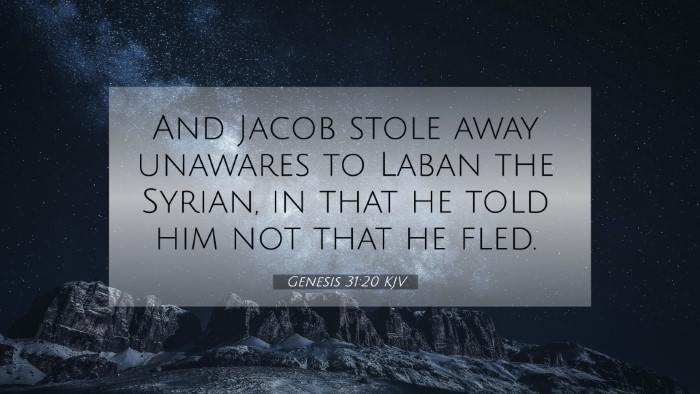Understanding Genesis 31:20
Genesis 31:20 states, "And Jacob stole away unawares to Laban the Syrian, in that he told him not that he fled." This verse occurs during a critical moment in the narrative of Jacob's life, as he decides to leave the household of his father-in-law, Laban, and return to his homeland. This action unfolds a rich tapestry of themes, relationships, and divine guidance.
Context and Background
This verse emerges in the context where Jacob has served Laban for many years. Throughout his time, Laban deceived Jacob multiple times regarding wages and given his daughters in marriage. Jacob's realization that he is being mistreated prompts him to take action. The act of leaving unnoticed signifies the urgency in Jacob's life and the necessity to escape from Laban's grasp.
Commentary Insights
Matthew Henry's Commentary
Henry highlights Jacob's departure as a tactical maneuver, stressing that it was not out of cowardice but a calculated escape from Laban’s manipulations. The idea of ‘stealing away’ underscores Jacob's need to break free before being confronted, suggesting the oppressive nature of Laban’s household. Henry further points out that despite the deceitful nature of the escape, Jacob is ultimately following the directive from God to return to his homeland.
Albert Barnes' Commentary
Barnes notes the significance of Jacob's stealth in leaving and connects it to the overall theme of struggle and divine providence in Jacob's life. His interpretation stresses that God had instructed Jacob to return to his homeland, which adds a layer of moral justification to Jacob's actions. Barnes emphasizes that this interaction sets up the future confrontation with Laban and reflects God's guiding hand throughout Jacob's journey.
Adam Clarke's Commentary
Clarke puts forward that Jacob’s actions were the culmination of his long-suffering under Laban's treachery. He notes the importance of Jacob following divine direction, reinforcing the idea that God was with Jacob through these trials. Clarke also draws attention to the significance of communication—Jacob did not inform Laban, which raises questions of trust and fidelity in relationships.
Thematic Interpretations
This verse exemplifies several themes present in the Bible, such as:
- Divine Guidance: Jacob's actions reveal his trust in God's direction despite possible moral ambiguities.
- Struggle for Identity: Jacob's flight signifies a larger struggle for establishing his own identity outside of Laban's influence.
- Deception and Truth: The dynamics of Jacob’s stealthy departure highlight the complexities of honesty and betrayal in familial and social contexts.
- Family Conflicts: The tensions within Laban's household reveal broader issues of loyalty and faithfulness.
- God's Covenant: Jacob's actions are aligned with the fulfillment of God's promise to him regarding land and progeny.
Bible Verse Cross References
Genesis 31:20 relates to several other scripture passages that enhance understanding through cross-referencing. Here are key cross-references:
- Genesis 28:15: God's promise of protection and guidance to Jacob.
- Genesis 31:3: God's command to Jacob to return to his homeland.
- Exodus 3:16: God instructs Moses to gather the elders of Israel, emphasizing God's guidance theme.
- Proverbs 21:1: The king’s heart is in the hand of the Lord, reiterating God’s sovereign influence.
- Isaiah 43:2: Assurance of God’s presence during trials aligns with Jacob's experience.
- Matthew 10:16: Instruction to be shrewd as serpents, relating to Jacob’s strategic departure.
- Romans 8:31: The assurance that God is for us, which provides context to Jacob's protective escape.
Insights on Cross-Referencing Biblical Texts
Cross-referencing Bible texts allows for a deeper understanding of themes and connections throughout scripture. The exploration of Genesis 31:20 through other verses leads to insights about divine intervention, the nature of human relationships, and the unfolding of God’s plan.
Tools for Bible Cross-Referencing
Utilizing tools for cross-referencing helps uncover layers of meaning behind biblical texts. These resources include:
- Bible concordances for finding related verses
- Bible cross-reference guides that outline themes and connections
- Digital cross-reference systems that allow for easy navigation
- Comprehensive materials for cross-referencing in Bible studies
- Methods for comparing scriptures across the Old and New Testaments
Conclusion
In Genesis 31:20, Jacob's unnoticed departure from Laban encapsulates profound themes of struggle, divine guidance, and the complexities of familial relationships. By engaging in cross-referencing, readers can explore a wealth of insights and connections that enrich their understanding of God’s narrative throughout the scriptures.


